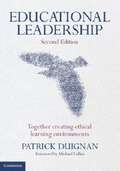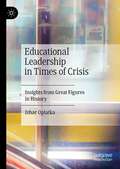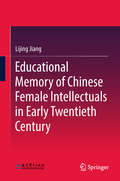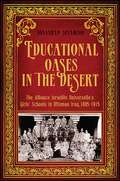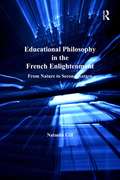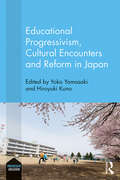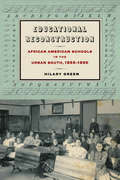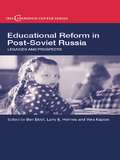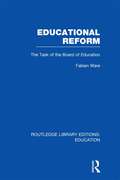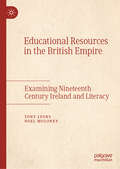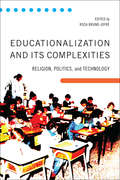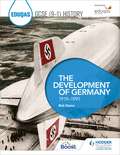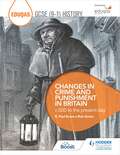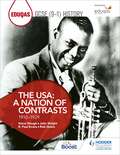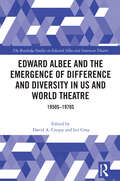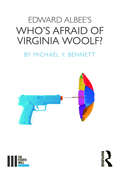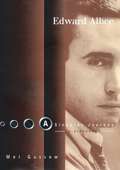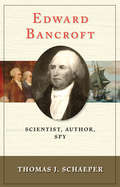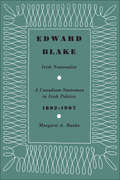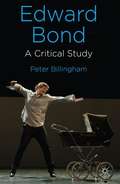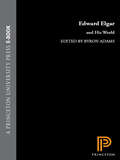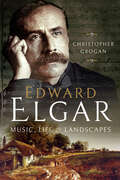- Table View
- List View
Educational Leadership
by Patrick DuignanThe second edition of Educational Leadership: Together Creating Ethical Learning Environments is a groundbreaking work at the forefront of current research into the ethical challenges inherent to leadership. Patrick Duignan combines a new perspective of leadership as an influence relationship, with a collective ethic of responsibility. Educational Leadership draws together cutting-edge research, theory and best practice on learning, teaching and leadership to assist leaders and teachers to better understand contemporary educational challenges and respond to them wisely, creatively and effectively. This book is indispensable for all system and educational professionals engaged in policy-making, leadership development, leading learning in schools and those in academe responsible for programs aimed at the improvement of learning, teaching and leadership.
Educational Leadership in Times of Crisis: Insights from Great Figures in History
by Izhar OplatkaThis book aims to fill the gap in our knowledge about crisis management in schools, its particular characteristics, and strategies from a historical point of view. It combines knowledge about educational leadership with biographical narratives of great leaders in history who have faced a tremendous crisis successfully and from whom we can learn a lot about effective coping strategies in times of crisis. The leaders in the book represent different nations and organizations, facing political, military, economic or social crises. The book provides a deeper knowledge necessary for preparing for a possible crisis and for managing it in successful ways if it comes and adds novel insights into the field of educational administration and leadership in the twenty-first century.
Educational Memory of Chinese Female Intellectuals in Early Twentieth Century
by Lijing JiangThis book studies three female Chinese intellectuals in the first half of the 20th century, namely Feng Yuanjun, Lu Yin, and Cheng Junying, the first graduates of Beijing Female Higher Normal College, which was the first-ever national higher educational institution for women in modern China. Combining narrative inquiry, life history, oral history, and psychohistory methods, it comprehensively explores the specific developmental paths and mental processes of the post-May Fourth female intellectuals, and examines the complex interrelationships between various factors including social, academic, gender, and educational evolution in the first half of the 20th century, and the emergence of modern Chinese female intellectuals.The book is highly recommended for all scholars, undergraduate and graduate students of modern Chinese history, gender and women’s studies, history of education, history of higher education, etc., and for all those who are interested in female Chinese intellectuals.
Educational Oases in the Desert: The Alliance Israelite Universelle's Girls' Schools in Ottoman Iraq, 1895-1915
by Jonathan SciarconDuring the late nineteenth and early twentieth centuries, the Alliance Israélite Universelle (AIU), a Paris-based Jewish organization, founded dozens of primary schools throughout the Middle East. Many were the first formal educational institutions for local Jewish children. In addition to providing secular education, the schools attempted to change local customs and "regenerate" or "uplift" communities. Educational Oases in the Desert explores the largely forgotten history of the AIU's schools for girls in Ottoman Iraq. Drawing on extensive archival research, Jonathan Sciarcon argues that teachers viewed female education through a gendered lens linked to their understanding of an ideal modern society. As the primary educators of children, women were seen as society's key agents of socialization. The AIU thus concluded that its boys' schools would never succeed in creating polished, westernized men so long as women remained uneducated, leading to the creation of schools for girls. Sciarcon shows how headmistresses acted not just as educators but also as models of modernity, trying to impart new moral and aesthetic norms onto students.
Educational Philosophy in the French Enlightenment: From Nature to Second Nature
by Natasha GillThough Emile is still considered the central pedagogical text of the French Enlightenment, a myriad of lesser-known thinkers paved the way for Rousseau's masterpiece. Natasha Gill traces the arc of these thinkers as they sought to reveal the correlation between early childhood experiences and the success or failure of social and political relations, and set the terms for the modern debate about the influence of nature and nurture in individual growth and collective life. Gill offers a comprehensive analysis of the rich cross-fertilization between educational and philosophical thought in the French Enlightenment. She begins by showing how in Some Thoughts Concerning Education John Locke set the stage for the French debate by transposing key themes from his philosophy into an educational context. Her treatment of the abbé Claude Fleury, the rector of the University of Paris Charles Rollin, and Swiss educator Jean-Pierre de Crousaz illustrates the extent to which early Enlightenment theorists reevaluated childhood and learning methods on the basis of sensationist psychology. Etienne-Gabriel Morelly, usually studied as a marginal thinker in the history of utopian thought, is here revealed as the most important precursor to Rousseau, and the first theorist to claim education as the vehicle through which individual liberation, social harmony and political unity could be achieved. Gill concludes with an analysis of the educational-philosophical dispute between Helvétius and Rousseau, and traces the influence of pedagogical theory on the political debate surrounding the expulsion of the Jesuits in 1762.
Educational Progressivism, Cultural Encounters and Reform in Japan (Progressive Education)
by Yoko Yamasaki Hiroyuki KunoEducational Progressivism, Cultural Encounters and Reform in Japan provides a critical analysis of educational initiatives, progressive ideas and developments in curriculum and pedagogy in Japan, from 1900 to the present day. Drawing on evidence of both cultural encounters and internal drivers for progressivism and reform, this book re-evaluates the history of Japanese education to help inform ongoing and future debates about education policy and practice worldwide. With contributions from Japanese scholars specialising in the history and philosophy of education and curriculum studies, chapters consider key collaborative improvements to teacher education, as well as group learning, ‘life education’, the creative arts and writing, and education for girls and women. The book examines Western influences, including John Dewey, Carleton Washburne and A. S. Neill, as well as Japan’s own progressive exports, such as holistic Zenjin education, Children’s Villages and Lesson Study, highlighting cultural encounters and progressive initiatives at both transnational and national levels. The chapters reflect on historical and political background, motivations, influences and the impact of Japanese progressive education. They also stimulate, through argument and critical discussion, a continuing discourse concerning principles, policy, politics and practices of education in an increasingly globalised society. A rigorous and critical study of the history of progressive education in Japan, this book will interest an international readership of academics, researchers and postgraduate students in the fields of progressive education, comparative education, social and cultural history, history of education, Japanese studies, curriculum studies, and the history of childhood.
Educational Reconstruction: African American Schools in the Urban South, 1865-1890 (Reconstructing America)
by Hilary N. GreenTracing the first two decades of state-funded African American schools, Educational Reconstruction addresses the ways in which black Richmonders, black Mobilians, and their white allies created, developed, and sustained a system of African American schools following the Civil War.Hilary Green proposes a new chronology in understanding postwar African American education, examining how urban African Americans demanded quality public schools from their new city and state partners. Revealing the significant gains made after the departure of the Freedmen’s Bureau, this study reevaluates African American higher education in terms of developing a cadre of public school educator-activists and highlights the centrality of urban African American protest in shaping educational decisions and policies in their respective cities and states.
Educational Reform in Post-Soviet Russia: Legacies and Prospects (Cummings Center Series #Vol. 20)
by Vera Kaplan Ben Eklof Larry E. HolmesThis volume consists of a collection of essays devoted to study of the most recent educational reform in Russia. In his first decree Boris Yeltsin proclaimed education a top priority of state policy. Yet the economic decline which accompanied the collapse of the Soviet Union dealt a crippling blow to reformist aspirations, and to the existing school system itself. The public lost faith in school reform and by the mid-1990s a reaction had set in. Nevertheless, large-scale changes have been effected in finance, structure, governance and curricula. At the same time, there has been a renewed and widespread appreciation for the positive aspects of the Soviet legacy in schooling.The essays presented here compare current educational reform to reforms of the past, analyze it in a broader cultural, political and social context, and study the shifts that have occurred at the different levels of schooling 'from political decision-making and changes in school administration to the rewriting textbooks and teachers' everyday problems. The authors are both Russian educators, who have played a leading role in implementation of the reform, and Western scholars, who have been studying it from its very early stages. Together, they formulate an intricate but cohesive picture, which is in keeping with the complex nature of the reform itself.Contributors: Kara Brown, (Indiana University) * Ben Eklof (Indiana University) * Isak D. Froumin, (World Bank, Moscow) * Larry E. Holmes (University of South Alabama) * Igor Ionov, (Russian History Institute of the Russian Academy of Sciences) * Viacheslav Karpov & Elena Lisovskaya, (Western Michigan University) * Vera Kaplan, (Tel Aviv University) * Stephen T. Kerr, (University of Washington) * James Muckle, (University of Nottingham) * Nadya Peterson, (Hunter College) * Scott Seregny, (Indiana University-Purdue University Indianapolis) * Alexander Shevyrev, (Moscow State University) * Janet G. Vaillant, (Harvard University)
Educational Reform: The Task of the Board of Education (Routledge Library Editions: Education)
by Fabian WareAs well as examining the history and contemporary state of primary and secondary education in England and Wales at the turn of the 19th Century, this volume provides comparative analyses of the education of Germany, Denmark and the British Empire (particularly India). Commercial, industrial and agricultural education is discussed, as is the training of teachers and methods of assessment.
Educational Resources in the British Empire: Examining Nineteenth Century Ireland and Literacy
by Tony Lyons Noel MoloneyThis book explores the impact of the Lesson Books of the National Board of Education in Ireland in the nineteenth century. The author contextualizes the books used in national schools as well as across the wider British Empire: in doing so, he highlights the influence of the religious, social, political and cultural realms of the time. Firmly grounding the volume in its historical context, the author goes on to explore the contemporary moral climate and social influences, including imperialism, morality, rote-learning and socialization. Through meticulous analysis of each Lesson Book, the author traces the evolution of education in Ireland as a reflection of contemporary society, as it changes and transforms in line with cultural, religious and social changes. This pioneering and comprehensive volume will be of interest and value to students and scholars of education in Ireland as well as education in the British Empire more widely.
Educationalization and Its Complexities: Religion, Politics, and Technology
by Rosa Bruno-JofréThis edited collection brings together scholars from Canadian and international institutions to discuss educationalization, a trend in modern societies that involves transferring social responsibilities onto the school system. This book brings a new dimension to the literature on educationalization by examining the concept in relation to Catholicism, Indigenous issues, the right to education, and historical studies grounded in both Canada and Chile. In these contributions, the book represents an attempt to both deepen the current discussion on the construction and use of educationalization as a concept as well as invite further exploration of this subject in relation to the increasing digitalization of life in the twenty-first century.
Eduqas GCSE (9-1) History (9-1) History (9-1) History (9-1) History (9-1) History (9-1) History (9-1) History (9-1) History (9-1) History (9-1) History (9-1) History (9-1) History (9-1) History (9-1) History (9-1) History (9-1) History: The Development of Germany, 1919-1991: The Development Of Germany 1919-1991
by Rob QuinnExam board: EduqasLevel: GCSESubject: HistoryFirst teaching: September 2016First exams: June 2018Endorsed by EduqasHelp every student to achieve their best, with bespoke support for Eduqas GCSE History from the leading History publisher for secondary schools.Structured around the key questions in the 2016 specification, this book:> Develops in-depth subject knowledge through clear and detailed coverage of the important issues, events and concepts> Builds students' historical skills and thinking as they progress through a range of activities and questions> Prepares students for assessment by providing step-by-step guidance and model answers for each question type> Increases understanding and enjoyment by including a rich variety of source material that brings the period to life
Eduqas GCSE (9-1) History (9-1) History (9-1) History (9-1) History (9-1) History (9-1) History (9-1) History (9-1) History: The Development of Germany, 1919-1991: The Development Of Germany 1919-1991
by Rob QuinnExam board: EduqasLevel: GCSESubject: HistoryFirst teaching: September 2016First exams: June 2018Endorsed by EduqasHelp every student to achieve their best, with bespoke support for Eduqas GCSE History from the leading History publisher for secondary schools.Structured around the key questions in the 2016 specification, this book:> Develops in-depth subject knowledge through clear and detailed coverage of the important issues, events and concepts> Builds students' historical skills and thinking as they progress through a range of activities and questions> Prepares students for assessment by providing step-by-step guidance and model answers for each question type> Increases understanding and enjoyment by including a rich variety of source material that brings the period to life
Eduqas GCSE (9-1) History Changes in Crime and Punishment in Britain c.500 to the present day
by R. Paul Evans Rob QuinnExam board: EduqasLevel: GCSESubject: HistoryFirst teaching: September 2016First exams: June 2018Endorsed by EduqasHelp every student to achieve their best, with bespoke support for Eduqas GCSE History from the leading History publisher for secondary schools.Structured around the key questions in the 2016 specification, this book:> Develops in-depth subject knowledge through clear and detailed coverage of the important themes, perspectives and developments> Builds students' historical skills and thinking as they progress through a range of activities and questions> Prepares students for assessment by providing step-by-step guidance and model answers for each question type> Increases understanding and enjoyment by including a rich variety of source material that brings different periods to life
Eduqas GCSE (9-1) History Changes in Crime and Punishment in Britain c.500 to the present day
by R. Paul Evans Rob QuinnExam board: EduqasLevel: GCSESubject: HistoryFirst teaching: September 2016First exams: June 2018Endorsed by EduqasHelp every student to achieve their best, with bespoke support for Eduqas GCSE History from the leading History publisher for secondary schools.Structured around the key questions in the 2016 specification, this book:> Develops in-depth subject knowledge through clear and detailed coverage of the important themes, perspectives and developments> Builds students' historical skills and thinking as they progress through a range of activities and questions> Prepares students for assessment by providing step-by-step guidance and model answers for each question type> Increases understanding and enjoyment by including a rich variety of source material that brings different periods to life
Eduqas GCSE (9-1) History The USA (9-1) History The USA (9-1) History The USA (9-1) History The USA (9-1) History The USA (9-1) History The USA (9-1) History The USA (9-1) History The USA: A Nation of Contrasts 1910-1929: A Nation Of Contrasts 1910-1929
by John Wright Steve Waugh R. Paul Evans Rob QuinnExam board: EduqasLevel: GCSESubject: HistoryFirst teaching: September 2016First exams: June 2018Endorsed by EduqasHelp every student to achieve their best, with bespoke support for Eduqas GCSE History from the leading History publisher for secondary schools.Structured around the key questions in the 2016 specification, this book:> Develops in-depth subject knowledge through clear and detailed coverage of the important issues, events and concepts> Builds students' historical skills and thinking as they progress through a range of activities and questions> Prepares students for assessment by providing step-by-step guidance and model answers for each question type> Increases understanding and enjoyment by including a rich variety of source material that brings the period to life
Eduqas GCSE (9-1) History The USA (9-1) History The USA: A Nation of Contrasts 1910-1929: A Nation Of Contrasts 1910-1929
by John Wright Steve Waugh R. Paul Evans Rob QuinnExam board: EduqasLevel: GCSESubject: HistoryFirst teaching: September 2016First exams: June 2018Endorsed by EduqasHelp every student to achieve their best, with bespoke support for Eduqas GCSE History from the leading History publisher for secondary schools.Structured around the key questions in the 2016 specification, this book:> Develops in-depth subject knowledge through clear and detailed coverage of the important issues, events and concepts> Builds students' historical skills and thinking as they progress through a range of activities and questions> Prepares students for assessment by providing step-by-step guidance and model answers for each question type> Increases understanding and enjoyment by including a rich variety of source material that brings the period to life
Edward Albee and the Emergence of Difference and Diversity in US and World Theatre: 1950s-1970s (Routledge Studies in Edward Albee and American Theatre)
by Les Gray David A. CrespyThis collection of essays seeks to present articles that examine the early ventures of the 1960s and 1970s in the progressive theatre of identity with a new contemporary view, considering the intersection of race, gender, ethnicity, economic class, and sexual orientation.In 1964, Edward Albee and his producers, Richard Barr and Clinton Wilder, produced Funnyhouse of a Negro by Adrienne Kennedy, and Dutchman by Amiri Baraka (then, Leroi Jones), and by 1968, had produced the seminal gay drama, The Boys in the Band by Mart Crowley. No other major American playwright of this period (including Thornton Wilder, Arthur Miller, Tennessee Williams, or William Inge) produced the plays of their junior colleagues with a specific focus on difference and diversity. For most scholars, these productions and Albee’s involvement in them are a somewhat obscure footnote in theatre history. But they remain important for their early support of diverse voices. Even as Albee’s career was skyrocketing, he and his producers had begun a producing project that sowed the seeds of diversity, equity, and inclusion in a decidedly anti-racist, decolonizing, and progressive move that still resonates powerfully today. While this book is not a hagiography and does not intend to paint Albee as without his own critical failings in terms of diversity in his own work and that of others, this volume of theatre history, dramatic literature, and performance essays takes a detailed, critical approach to Albee’s engagement with other initiating plays, productions, producers, theatre companies, theatre artists, and performances in the United States that pushed the dial toward difference and diversity in the late 1950s through the late 1970s, beginning the formations of new theatres of identity across the United States.This volume will be of great interest to students and scholars in theatre and performance studies.
Edward Albee's Who's Afraid of Virginia Woolf? (The Fourth Wall)
by Michael Y. BennettEdward Albee’s Who’s Afraid of Virginia Woolf? shocked audiences and critics alike with its assault on decorum. At base though, the play is simply a love story: an examination of a long-wedded life, filled with the hopes, dreams, disappointments, and pain that accompany the passing of many years together. While the ethos of the play is tragicomic, it is the anachronistic, melodramatic secret object—the nonexistent "son"—that upends the audience’s sense of theatrical normalcy. The mean and vulgar bile spewed among the characters hides these elements, making it feel like something entirely "new." As Michael Y. Bennett reveals, the play is the same emperor, just wearing new clothes. In short, it is straight out of the grand tradition of living room drama: Ibsen, Chekhov, Glaspell, Hellmann, O’Neill, Wilder, Miller, Williams, and Albee.
Edward Albee: A Biography
by Mel GussowIn 1960, Edward Albee electrified the theater world with the American premiere of The Zoo Story, and followed it two years later with his extraordinary first Broadway play, Who's Afraid of Virginia Woolf? Proclaimed as the playwright of his generation, he went on to win three Pulitzer Prizes for his searing and innovative plays. Mel Gussow, author, critic, and cultural writer for The New York Times, has known Albee and followed his career since its inception, and in this fascinating biography he creates a compelling firsthand portrait of a complex genius.The book describes Albee's life as the adopted child of rich, unloving parents and covers the highs and lows of his career. A core myth of Albee's life, perpetuated by the playwright, is that The Zoo Story was his first play, written as a thirtieth birthday present to himself. As Gussow relates, Albee has been writing since adolescence, and through close analysis the author traces the genesis of Who's Afraid of Virginia Woolf?, Tiny Alice, A Delicate Balance, and other plays. After his early triumphs, Albee endured years of critical neglect and public disfavor. Overcoming artistic and personal difficulties, he returned in 1994 with Three Tall Women. In this prizewinning play he came to terms with the towering figure of his mother, the woman who dominated so much of his early life.With frankness and critical acumen, and drawing on extensive conversations with the playwright, Gussow offers fresh insights into Albee's life. At the same time he provides vivid portraits of Albee's relationships with the people who have been closest to him, including William Flanagan (his first mentor), Thornton Wilder, Richard Barr, John Steinbeck, Alan Schneider, John Gielgud, and his leading ladies, Uta Hagen, Colleen Dewhurst, Irene Worth, Myra Carter, Elaine Stritch, Marian Seldes, and Maggie Smith. And then there are, most famously, Elizabeth Taylor and Richard Burton, who starred in Mike Nichols's acclaimed film version of Who's Afraid of Virginia Woolf? The book places Albee in context as a playwright who inspired writers as diverse as John Guare and Sam Shepard, and as a teacher and champion of human rights.Edward Albee: A Singular Journey is rich with colorful details about this uniquely American life. It also contains previously unpublished photographs and letters from and to Albee. It is the essential book about one of the major artists of the American theater.
Edward Bancroft: Scientist, Author, Spy
by Thomas J. SchaeperA man of as many names as motives, Edward Bancroft is a singular figure in the history of Revolutionary America. Born in Massachusetts in 1745, Bancroft moved to England as a young man in the 1760s and began building a respectable résumé as both a scientist and a man of letters. In recognition of his works in natural history, Bancroft was unanimously elected to the Royal Society, and while working to secure French aid for the American Revolution, he became a close associate of such luminaries as Benjamin Franklin, Silas Deane, and John Adams. Though lauded in his time as a staunch American patriot, when the British diplomatic archives were opened in the late nineteenth century, it was revealed that Bancroft led a secret life as a British agent acting against French and American interests. In this book, the first complete biography of Bancroft, historian Thomas J. Schaeper reveals the full extent of the agent's deception during the crucial years of the American Revolution. Operating under aliases, working in ciphers, and leaving coded messages in the trees of Paris's Tuileries Gardens, Bancroft filtered information from unsuspecting figures including Franklin and Deane back to his contacts in Britain, navigating a complicated web of political allegiances. Through Schaeper's keen analysis of Bancroft's correspondence and diplomatic records, this biography reveals whether Bancroft should ultimately be considered a traitor to America or a patriot to Britain.
Edward Blake: Irish Nationalist, A Canadian Statesman in Irish Politics
by Margaret A. BanksIn 1892, Edward Blake, ex-Premier of Ontario and former leader of the Liberal party in the Canadian House of Common, was invited by the Irish parliamentary party to stand for election in the British Parliament. This surprising invitation grew out of the conflicts of the Irish "Home Rule" controversy, then a critical issue in British politics. When Blake abandoned the Canadian political scene he had just severed connections with the Liberal party, which he had served as Minister of justice in the only federal Liberal administration down to 1896, and as Leader of the Opposition from 1880 to 1887. Irish Home Rule was a cause which engaged the sympathies of Liberals all over the British Empire, and although Blake intended to return permanently to Canada, he remained a member of the British Parliament, devoting ceaseless efforts to the Irish interest, until illness forced his retirement in 1907.Up to the present time, little attention has been given by either Irish or Canadian historians to the Irish career of Edward Blake. It spanned the years of failure and frustration which stretched between the spectacular period of Gladstone and Parnell to the excitements of the third Home Rule Bill, the Ulster resistance, and the Sinn Fein movement. Although Blake declined much part in parliamentary debate during these arid years, he played a vital and unappreciated role in the inner discussions and struggles of the Irish Nationalist movement. Blake was not only a statesman of blameless reputation, but a constitutional authority whose superior abilities were lying unused in Canada after Confederation. He brought to the Irish party a cool judgment, and a consciousness of the role of statesmanship in politics, which won the highest respect of all its leaders, including McCarthy and Redmond.Dr. Banks has made a searching assessment of Blake's historical position: the reason why, in the eyes of his contemporaries, he never attained the political status which he merited, and the basis for the enormous respect which he was accorded by all who worked with him in the inner circles of the party. It is an informative account, based on careful research, of an enigmatic figure in Canadian politics, whose career encountered unequalled frustrations and discouragement, but whom Sir Wilfrid Laurier unhesitatingly termed "the most powerful intellectual force in Canadian political history." Of interest to everyone concerned with Irish and Imperial problems, it will merit the attention of political analysts and historians alike.
Edward Bond: A Critical Study
by Peter BillinghamThis new study of one of Britain's greatest modern playwrights represents the first major, extended discussion of Edward Bond's work in over twenty years. The book combines rigorous and stimulating analysis and discussion of Bond's plays and ideas about drama and society. For the first time, there is also discussion of selected plays from his later, post-2000 period, including Innocence and Have I None, alongside explorations of widely studied plays such as Saved.
Edward Elgar and His World
by Byron AdamsEdward Elgar (1857-1934) is undoubtedly one of the most fascinating, important, and influential figures in the history of British music. He rose from humble beginnings and achieved fame with music that to this day is beloved by audiences in England, and his work has secured an enduring legacy worldwide. Leading scholars examine the composer's life in Edward Elgar and His World, presenting a comprehensive portrait of both the man and the age in which he lived. Elgar's achievement is remarkably varied and wide-ranging, from immensely popular works like the famous Pomp and Circumstance March no. 1--a standard feature of American graduations--to sweeping masterpieces like his great oratorio The Dream of Gerontius. The contributors explore Elgar's Catholicism, which put him at odds with the prejudices of Protestant Britain; his glorification of British colonialism; his populist tendencies; his inner life as an inspired autodidact; the aristocratic London drawing rooms where his reputation was made; the class prejudice with which he contended throughout his career; and his anguished reaction to World War I. Published in conjunction with the 2007 Bard Music Festival and the 150th anniversary of Elgar's birth, this elegant and thought-provoking volume illuminates the greatness of this accomplished English composer and brings vividly to life the rich panorama of Victorian and Edwardian Britain. The contributors are Byron Adams, Leon Botstein, Rachel Cowgill, Sophie Fuller, Daniel M. Grimley, Nalini Ghuman Gwynne, Deborah Heckert, Charles Edward McGuire, Matthew Riley, Alison I. Shiel, and Aidan J. Thomson.
Edward Elgar: Music, Life and Landscapes
by Christopher GroganThe first full-length study of the English composer’s complex interaction with his physical environment, and its new relevance in the 21st century.More perhaps than any other composer, Edward Elgar (1857-1934) has gained the status of an “icon of locality,” his music seemingly inextricably linked to the English landscape in which he worked. This, the first full-length study of Elgar’s complex interaction with his physical environment, explores how it is that such associations are formed and whether it is in any sense true that Elgar alchemized landscape into music.It argues that Elgar stands at the apex of an English tradition, going back to Blake, in which creative artists in all media have identified and warned against the self-harm of environmental degradation and that, following a period in which these ideas were swept away by the swift but shallow tide of Modernism in the decades after the First World War, they have since resurfaced with a new relevance and urgency for twenty-first century society.Written with the non-specialist in mind, yet drawing on the rich resources of post-millennial scholarship on Elgar, as well as geographical studies of place, the book also includes many new insights relating to such aspects of Elgar’s output as his use of landscape typology in The Apostles, and his encounter with Modernism in the late chamber music. It also calls on the resources of contemporary social commentary, poetry and, especially, English landscape art to place Elgar and his thought in the broader cultural milieu of his time. A survey of recent recordings is included, in the hope that listeners, both familiar and unfamiliar with Elgar’s music, will feel inspired to embark on a voyage of (re)discovery of its endlessly rewarding treasures.
